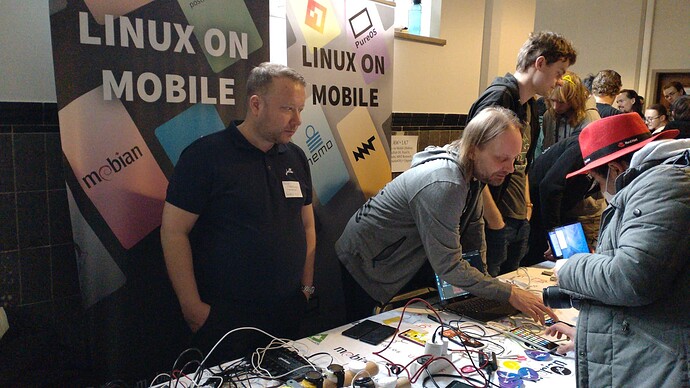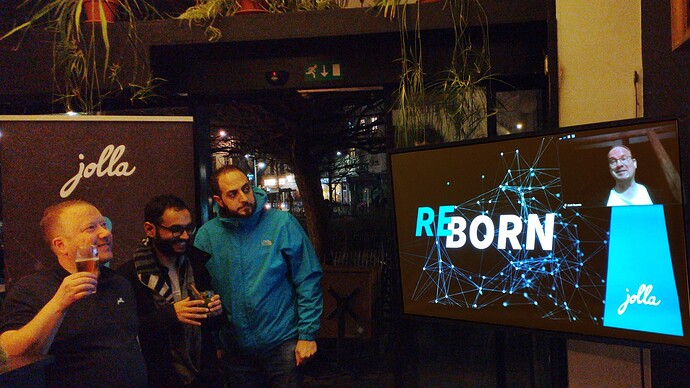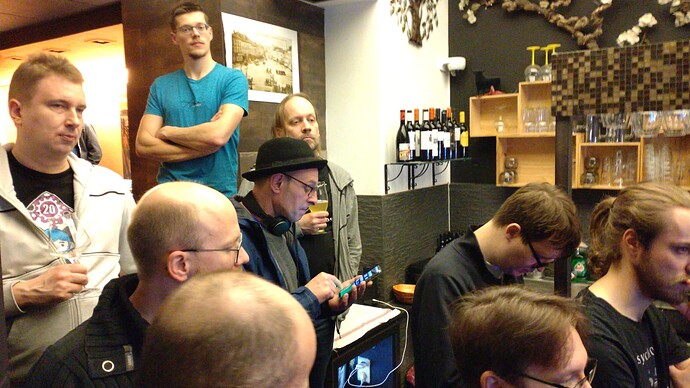Sailfish OS update from Jolla
This last weekend the Jolla team, and an impressive number of the Sailfish Community, were attending FOSDEM’24 in Brussels. FOSDEM describes itself as “a free event for software developers to meet, share ideas and collaborate”, but the best description I’ve so far heard for it is “OpenSource Disneyland”.
Perhaps the reason why FOSDEM works so well is that it captures the spirit of open source: attendance is free; it’s completely open (you don’t even have to register to attend); it’s inclusive, attracting a diverse range of attendees; and it’s about as chaotic as they come.
Jolla has a long history of FOSDEM attendance. In previous years there have been talks by Jolla and community members about Sailfish OS, birds-of-a-feather (BOF) events and the now-regular community dinner.
This year was no different, with Sailfish OS represented on the Linux on Mobile stand alongside seven other mobile Linux distributions. There were also several talks related to or relevant for Sailfish OS.
The stand was a great opportunity for us to talk to some of our most committed users, but also to draw in new users. There was an incredible amount of interest: not a moment passed across the entire weekend when the stand wasn’t crowded around with people looking at the astonishing collection of mobile devices on show (see the photos if you don’t believe me!). There was huge interest in Sailfish OS and it’s clear that there’s an appetite for a Linux-based mobile operating system to replace Android as a daily-driver phone.
But the real highlight of the event for us was the Jolla event on the Saturday evening. Jolla took over a tapas restaurant near the centre of Brussels to host several dozen Sailfish enthusiasts to present Jolla Reborn.
The event started with a a very open presentation about Jolla’s future direction and involvement of the community. Presented by Antti Saarnio, Chairman of the Board of Directors and one of Jolla’s original founders, joining the event online alongisde several Sailors attending in-person.
Antti talked about the best way to harness new and developing technologies, especially artificial intelligence, the Internet of things (IoT) and how users want to interact with these technologies. Antti stressed the importance of these new technologies working in tandem with Jolla’s strengths in the mobile space, including privacy and its strong community links. This was placed in the context of devices and the cloud: where should AI processing take place? Could it be on a separate device, in the cloud, but still controlled by the user? How does this tie in to other devices the user may have? And crucially, what tools will the community need in order to develop applications and solutions to best make use of such capabilities.
Antti’s presentation was followed by a very frank Q&A session, giving the opportunity for members of the community to express their thoughts about the restructuring, the future direction of Jolla and how best it can serve the community. Discussion topics included the use of Artificial Intelligence to improve the product, potential revenue streams, commercial customers and partners to approach, the way to develop for new devices and the role of Sailfish OS as a European operating system.
At the end of the presentation everyone was encouraged to complete a questionnaire. The purpose was to allow input into this future direction. As Jolla is reborn and heads into what is undoubtedly going to be an exciting and challenging world for technology and the way we all interact with it, it’s crucial that we have your thoughts on Jolla’s place in this world and where Sailfish OS fits into it.
After all of the thoughtful and energetic discussion, the evening was rounded off by a very well-deserved tapas buffet and some great discussion between friends.
FOSDEM is always a great opportunity for Jolla to interact with the community, all with the aim of furthering Sailfish OS and making it the platform we all love to use. And this year was no different. It was great to see everyone, to get the opportunity to attract new faces to the Sailfish community, and to hear your experiences and thoughts on how to improve Sailfish OS. But crucially also, to share what already makes it so great. Thanks to everyone who attended, it was wonderful to see you there.
Energy from the Community
Repository roundup
Multimedia stack
-
gssdp, the GLib SSDP resource discovery library, mal updated it to 1.6.3. -
gupnp, the GLib UPnP library, mal updated it to 1.6.6, updated theavplugin to 0.14.1 and thedlnaone to 0.12.0, also moving the repositories to use submodule. -
rygel, a collection of UPnP/DLNA services, mal upgraded it to 0.42.5. -
qtgrilo, a framework for discovering and browsing media, Qt bindings, pvuorela added a property signaling a fetching data state. -
amber-mpris, QML bindings for remote control of music players, tomin1 fixed a segmentation fault in the property change timer. -
libsdl-gfx, the simple direct media layer - graphics primitives, Thaodan removed upstream enabling MMX on Arm. -
sdl, a multimedia library, mal worked in a branch to upgrade it to version 2.30.0. He also upgraded add-on libraries in the process, withlibsdl-mixerto 2.8.0,libsdl-imagemoving to 2.8.2, andlibsdl-ttfto 2.22.0.
Communication bits
-
connman, the connection manager, LaakkonenJussi modified it to emit a change signal also when default service is changed, so higher layers can properly interpret it. LaakkonenJussi also worked to reduce the difference with upstream by selecting several upstream commits. -
libconnman-qt, QML bindings for the connection manager, completely moved route parsing into ConnMan. -
messagingframework, the email Qt framework, dcaliste merged latest upstream, bringing a fix for*.ascattachments being not displayed in the email application. -
nemo-qml-plugin-email, QML bindings for emails, dcaliste fixed a bug creating duplicated files on attachment download. The change also allows to save the attachments directly in~/Downloads/instead of putting them in a complex tree structure, and is currently under discussion. -
bluez5, the Linux Bluetooth stack, mal moved to version 5.72.
User interface
-
lipstick, the home screen code (open source parts), krnlyng added a signal when the client closes a window. This signal (terminated) notifies that the application associated with the surface has terminated abnormally. This is based onqtwaylandsignaling when the client destroys a surface.
Other applications
-
sailfish-office, the document application, dcaliste proposed to store passwords for read-protected PDF documents.
Low level libraries
-
tzdata, the time zone data (and some other geographical data), mal proposed to update it to 2023d. -
zypper, a package manager, mal updated it to 1.14.68 and its library companion to 17.31.28. -
python3-zypp, Python module for zypper, mal fixed compatibility withlibzypp17.29.0. -
aspell, a spell checker, markolemmetty updated it to 0.60.8.1, fixing CVE-2019-25051 vulnerability. -
fakeroot, gives a fake root environment, mal updated it to 1.29. -
libsoup3, the web access library based on GObject, is a new repository separated from older version 2 of thelibsouplibrary. mal started it with version 3.4.4. -
ca-certificates, the system-wide authentication certificates, mal updated them to 2023.2.62_v7.0.401.
Developer’s corner
Thaodan removed the %make_install macro for RPM packaging. He thus fixed many packaging directives in various repositories:
- in
telepathy-accounts-signon, - in
tzdata-timed, - in
libmlocale, - in
qr-filter-qml-plugin,
There is also an on-going maintenance task to remove the static libraries (and libtool .la files) from the distributed package when they don’t make sense. This obviously will reduce a bit the download and installation footprint for the next update:
- in
util-linux, - in
gdb, - in
qtwayland, - in
procps, - in
qtbase, - in
btrfs-progs, - in
gmime, - in
libpcap, - in
libsdl-sound, - in
udisks2, - in
libusb1, - in
nspr, - in
connman-network-monitor, - in
libsdl-gfx,
Further development corner items:
-
grep, the searching command line tool, mal replace the dependency onpcrewithpcre2. -
gecko-dev, Mozilla’s Gecko web rendering engine, mal backported fixes to build against newerglibc. -
sailfish-secrets, a framework to use encryption techniques, mal fixed a compilation issue with newergcc. -
osc, the command line interface to work with OBS (the Open Build Service), thaodan is proposing to upgrade from 0.168.2 to 1.5.1. -
PackageKit, a D-Bus abstraction layer that allows the session user, mal backported a fix forgcc10. -
libglibutil, a library extending GLib with convenient utilities, slava added a function,gutil_idle_pool_get_default(), making usage ofGUtilIdlePoolsimpler in multi-threaded environments. slava also modified this class with two commits, one treating NULL parameter as the default pool and another returning the value as pushed to the pool. -
qemu-usermode, a universal CPU emulator, mal changed thestatxcall to use the one fromglibcinstead of the syscall one. Like that sb2 will be able to intercept the call. -
scratchbox2, the cross-compilation tool used by the SDK, mal added a wrapper forstatxcall. Thaodan replaced deprecatedegrepandfgrepand used the GNU option for regexp instead of the Posix one (the version ofsedis currently too old for that). -
libshadowutils, a library to used shadow tools, Thaodan updated it to 0.0.4, also upgrading the packaging to usecmakemacros and packaging Sailfish OS changes as a patch.
Please feed us your news
As always, please do not hesitate to share your ideas, thoughts, or suggestion for future newsletter topics.
Let’s keep working together!
Please do also join us at our community meetings on IRC, Matrix and Telegram. Next community meeting will be on the 15th February



